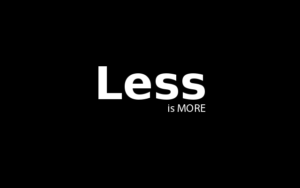People will tune you out when you act like a book. People will check out the cover, maybe pay attention to the inside of the jacket, and then close the cover, put you back on the shelf, and forget about you.
The most common reason people tune you out is predictability, I wrote about that months ago. Acting like a book, is a very close second on the list of what makes a mediocre public speaker.
If you act like a colorful picture book, you’ll be okay, but most mediocre speakers act like one of those long, poorly formatted, picture-less research studies that’s hardbound in a blank, solid cover.
Verbal communication and public speaking skills are not the same as writing skills.
How to Be a Book
The first rule of being a book:
It’s the reader’s responsibility to understand
When your audience is reading, they have already committed to putting in the effort to read, think, and understand. Written communication has the advantage that you already know the reader is committed and engaged.
Second rule of being a book:
Give them lots of information
Nobody wants to buy a book and feel like they read 300 pages for nothing. You better include lots of great stats, lots of proofs and examples, and lots of details.
Readers expect to concentrate. They read and reread, backtrack and sometimes flip pages out of order. You better give them lots of information!
In other words the structure of a book might look something like this:
Agree with me message because …
- It’s convenient
- It’s easy
- It’s cool
My book above, is structured to give you three, or more reasons to agree with me. Most books have 7, 10 or even hundreds of tips, techniques, and arguments.
In a written message you want to say lots of things about your topic. The reader does all the work. The reader finds the parts that are most relevant, reads, rereads, and analyzes.
Don’t Be a Book!
If you want better verbal presentation skills, you can’t assume the audience will take on that responsibility. When you’re communicating verbally: DON’T BE A BOOK!
Don’t be a book. Don’t be an essay. Don’t be a research paper.
If you take “your book” and present it verbally, you present as if it’s the listener’s responsibility to do all the work. No offense, but even if you are a great speaker, trying to concentrate on your every word for more than a few minutes is exhausting.
First rule of NOT being a book:
It’s YOUR responsibility to make them understand
 As a public speaker, you’re listener doesn’t have the luxury of choosing when, how much, or how slowly they read. They only have one choice, listen or not to listen. Therefore, when presenting verbally it’s YOUR responsibility to make it easy.
As a public speaker, you’re listener doesn’t have the luxury of choosing when, how much, or how slowly they read. They only have one choice, listen or not to listen. Therefore, when presenting verbally it’s YOUR responsibility to make it easy.
Second rule of NOT being a book:
Don’t give them lots of information
The audience at your presentation, without written information, has no rewind, stop or pause buttons. The more information you give them, the harder you are forcing them to work. Good public speaking skills make it easier for the listener, not harder.
Whether it’s due to their laziness, your ambiguity, or a distraction, a listener only has to miss one step in your logic to subvert your good intentions. With no rewind button, everything you say after that missed step is pointless.
Either they get caught up trying to understand something they missed, and you lose them. Or they stop trying, and you lose them. Either way, you lose them. They tune out.
Verbal Presentation Organization
The structure of a non-book (verbal presentation) requires that you narrow your presentation to the most relevant topic. Verbal presentations are ideal for this because you have the ability to interact:
“Tell me what’s most important to you?”
“Convenience!”
Let me show you three ways my idea is “convenient.”
1. Convenient because …
2. Convenient because …
3. Convenient because …
 Notice that that verbal outline only covers one thing, even though the “book” version would cover 3, 5, of 10 things.
Notice that that verbal outline only covers one thing, even though the “book” version would cover 3, 5, of 10 things.
Nearly everyone who contacts me for public speaking coaching or speechwriting help has lots of great content–they have a “book.” Whether it’s officially published or not, they have a book’s worth of information.
Nearly every speech I review and evaluation includes the “3 ways” or the “7 steps” or “10 laws” and so forth.
I get it. Your product has 12 great features and you want to talk about all of them.
DON’T!
Pick one–the one that matters most to the listeners–and give me several examples that all illustrate that ONE thing.
If you ask professional speakers you’ll probably hear this rule of thumb
Say only one thing every 15 minutes.
No rule is hard and fast, but 10-15 minutes is a good ballpark.
If you really must tell me more than one thing, you can, but you need a lot more time. If you’re trying to show me all 12 things in 15 minutes you’re more than likely a mediocre speaker.
I’m lazy (and so are most listeners). I’ll pay attention to the first one (maybe) and then tune out.
If you really want to tell me all 12 things, you need at least two hours (12 times 10+ minutes each).
Conquer Public Speaking Mediocrity
In a book, you tell the reader THREE THINGS (or more). In a verbal presentation you tell the listener ONE THING three(or more) different ways.
Verbally you can’t tell them everything. You can’t give them all the information that’s in the book. See my previous posts about the big lie that you need more information.
This is so critically important that I need to repeat myself:
In a book, you tell the reader THREE THINGS (or more). In a verbal presentation you tell the listener ONE THING three (or more) different ways.
Lot’s of people know lots of great information. Lot’s of people can WRITE great content. But lot’s of people don’t condense that information correctly when they present verbally.
If you do, you will instantly become more clear, more memorable, and more successful at verbal communication. You will take your presentation from mediocrity to excellence.
In one of life’s great ironies, you may become a better writer when you say more, but you become a better speaker when you say less.
When your speaking, don’t be a book!
When you make it YOUR responsibility to keep the listener engaged you change everything.
Your “book” represents everything you know. It represents your contribution to your organization and customers. Your “book” is your expertise, talents, and value.
Know everything in the book, but don’t act like a book. Give them something a book can’t give–interaction.
Make a great impression interacting about ONE thing. When you prove one thing so thoroughly, you’ll leave a great impression, and leave the listener wanting more. When the audience wants more, they won’t tune out.
They’ll invest in YOU–they’ll buy the book.



